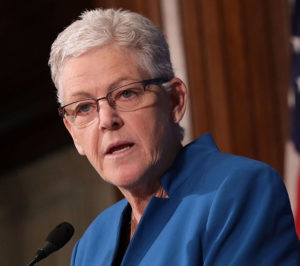One of the largest and most powerful environmental industry groups, the Natural Resources Defense Council (NRCD), has hired former EPA Administrator Gina McCarthy as its new president. Although NRDC put out press releases, the hiring escaped the notice of nearly every reporter in the country. Perhaps it didn’t seem especially unusual, nor would it be, but for the feeding frenzy about such “conflicts of interest” in the current Administration.
 A November 9 New York Times headline, “Interior Chief’s Lobbying Past Has Challenged the Agency’s Ethics Referees,” was repeated in news outlets across the country for two solid weeks. The article alleges that Interior Secretary David Bernhardt faces constant “conflict of interest” problems because he formerly worked for a law firm with clients who have an interest in Interior Department matters. We are supposed to be outraged that he and his former clients even sued the Interior Department on several occasions. Bernhardt had worked at the Interior Department before (as its top attorney), as well as on Capitol Hill, and that law firm hired him precisely because his expertise in those issues was valuable to clients. Would such a firm survive if it only hired attorneys with no experience in the issues their clients cared about?
A November 9 New York Times headline, “Interior Chief’s Lobbying Past Has Challenged the Agency’s Ethics Referees,” was repeated in news outlets across the country for two solid weeks. The article alleges that Interior Secretary David Bernhardt faces constant “conflict of interest” problems because he formerly worked for a law firm with clients who have an interest in Interior Department matters. We are supposed to be outraged that he and his former clients even sued the Interior Department on several occasions. Bernhardt had worked at the Interior Department before (as its top attorney), as well as on Capitol Hill, and that law firm hired him precisely because his expertise in those issues was valuable to clients. Would such a firm survive if it only hired attorneys with no experience in the issues their clients cared about?
Similarly, current EPA Administrator Andrew Wheeler is under constant attack from the environmental industry for the same “offense.” The Environmental Defense Fund calls him “a former coal lobbyist plagued by conflicts of interest.” The Center for Biological Diversity, another giant environmental industry group, sued the EPA demanding records of Wheeler’s meetings with energy lobbyists with whom he once worked. Their attorney said, “The public needs to know what happened between Wheeler’s former employer and the environmental agency he’s now running into the ground. We seem to have another fox guarding the henhouse.”
These same environmental organizations, though, are filled with staffers and administrators who once worked for the Administration, including the EPA, Interior Department, and other federal agencies. This is not shocking, it is not illegal, and it is certainly not new.
Consider NRDC’s history with the EPA. The organization brags on its websites that it has sued the Administration dozens of times, especially the EPA. NRDC sued over EPA’s revision of toxic chemical rules, mercury guidelines, New York water standards, and pesticide classifications. It filed high-stakes lawsuits against EPA’s rollback of the Obama “clean power plan” to kill the coal industry, and the new interpretation of “Waters of the U.S.” Along with the Paris climate treaty, these were among the top priorities for Gina McCarthy when she was EPA’s Assistant Administrator for Air in Obama’s first term, and the top Administrator in his second. Will she now excuse herself from any involvement in such lawsuits because of her obvious “conflict of interest?” She certainly did not do so while working for the public.
McCarthy is a decent person who would otherwise not deserve such a loaded question, but for the fact that she now runs one of the most hypocritical organizations in Washington – on this specific issue. Her personal experience should prompt NRDC to end its legal “conflict” attacks on Administrators with whom it disagrees.
She is the embodiment of Washington’s oft-criticized “revolving door.” She has run state environmental agencies, an environmental program at Harvard, worked for a private equity firm with environmental investments (Pegasus Capital), been in and out of the EPA, and is now running one of the largest environmental groups, with activities directly connected to the EPA. That’s why it made sense for them to hire her. And in a future democratic Administration, she might well be expected to return to public service.
It is natural that when Administrations change, top officials go back to the private sector, and private sector leaders come into the new Administration. Because the party in power changes frequently, many leaders have moved in and out of federal agencies, and made a good living in private sector posts, where they trade on their expertise, and try to influence government on behalf of clients. It has always been that way, and always will be, because it is smart. Presidents are smart to appoint experienced executives, and private organizations are smart to hire leaders who know these agencies.
So enough crocodile tears about “ethical conflicts” plaguing current officials – who are influencing policy exactly the same way their opponents did when they were in power. Elections have consequences, and people are in power with whom these groups disagree. The proper forum for their argument is the next election, not the already overburdened courts.
An edited version of this column appeared in the Grand Junction Daily Sentinel November 15, 2019.




Comments on this entry are closed.